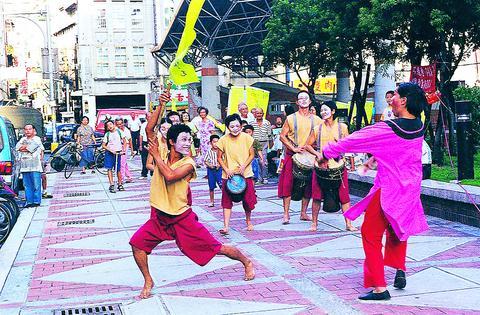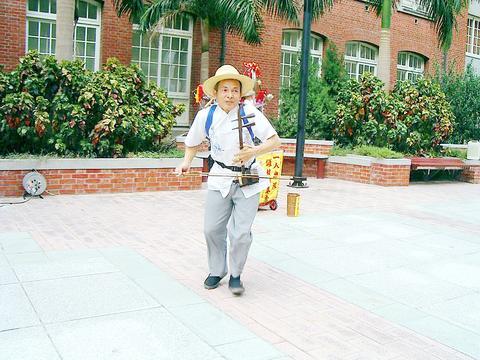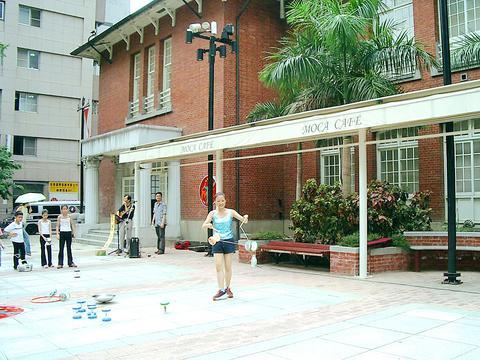If you think you can beat a one-man band playing eight instruments simultaneously at the plaza of Tamshui MRT Station on the weekend, there's now an unprecedented opportunity to bring your talent out into the open. Taipei's Bureau of Cultural Affairs (台北市政府文化局) has created the Taipei City Street Artists Performance Permit (台北市街頭藝人使用公共空間進行收費展演許可) to allow 350 people to perform at 26 outdoor public spaces across Taipei. This program will incorporate the already existing Taipei Rapid Transit Corporation (TRTC, 台北捷運公司) MRT Street Artist program which has been in operation for the last six years.
The culture bureau has increasingly been looking to other countries for ideas on cultural policies. The permit system was inspired by the cities of Cambridge, San Francisco and Tokyo where governments have set up special districts for street artists.
"The concept behind this program is a cultural openness. In these districts, public spaces have been liberated. Art is no longer confined to the forbidding halls of high art. It's out there for everyone to participate. As long as there is space and talent, there is street performance. Providing space for street artists not only helps tourism but also adds color to the urban scene," said Lee Ying-ping (

PHOTO COURTESY OF THE TAIPEI CULTURAL AFFAIRS BUREAU
After TRTC issued the first street artist permit to Wang Heng-yi (
Similar but short-term programs have been launched on a smaller scale in Penghu and Ilan.
The 26 locations in Taipei include the plazas outside Chungshan Hall (中山堂), the Taipei Children's Recreation Center (兒童育樂中心中心), the Taipei Fine Arts Museum (台北市立美術館) and eight MRT stations. "All the resources from different bureaus in the city government are behind this so that we can make most use of these locations. Street performance is now always near people," Lee said.

PHOTO: VICO LEE, TAIPEI TIMES
Like existing programs, there is expected to be a great diversity of genres, ranging from the usual portraiture and singing to less common glass-making and pantomime.
"Whether it's dance, music, crafts or painting, it's an expression of one's talent. Hopefully as people express themselves through their individual forms of performance, the downtown area will become more human. Seeing people doing something creative puts people in a good mood and makes people more creative," Lee said. "The whole point of the program is to encourage people who think they have a talent to come out and show it off."
The program is likely to go down well with potential performers, many of whom eagerly long for a stage and an audience.

PHOTO: VICO LEE, TAIPEI TIMES
Chang Ya-wen (
"It feels so free performing out of concert halls, with my audience next to me. It takes no rehearsal and the audience can come and go as they want," Chang said. "In a concert hall, performers are always worried whether they're performing like a professional should. The audience is not even allowed to cough. On the street, my friends and I can talk with each other when we play our instruments and even invite children to join in. There's more sharing and interaction between performer and audience."
The only drawback of Chang's performing experience in underpasses is the police. If caught, street performers are fined NT$1,200, as are peddlers.
Like many occasional street performers, Chang cares very little about profit. Fun is her reason for performing. "Once I sang songs in an underpass when it was almost midnight. There were very few passers-by and even fewer stopped to listen. One man finally came by and put a fifty-dollar coin before me, which I thought he did out of pity. But it doesn't matter how much I earn. It's just fun."
The street is also a place for performers to try out unconventional styles. "Once my friends and I played a composition of mind, a piece for keyboard, cello and bongos. The music was abstract and modernistic, something we did not think would appeal to people, but some people stopped to listen. We saw they even enjoyed it. The belief that the public out on the street cannot accept difficult music is not true," Chang said.
Andy Wang (
"Pop music lyrics nowadays are too explicit. The beauty of well-written verse is long forgotten. So we perform these songs to remind people of that era of poetic lyrics," Chang said. The duo have established a fan base. Their most dedicated fan is a housewife in her 70s, who can often be seen performing with them.
Performing on the street can be challenging even for the experienced studio singer. "With radio and TV, there's always some distance between the audience and us. On the street, the listeners are only two steps away. It takes some courage to be a street performer," Wang said.
Still, Wang deemed his performance in the past year a valuable experience. "When we were setting up equipment in an underpass, people hurried by wearing the usual cold and joyless expression of Taipei residents. But when we started to sing, a few passers-by began turning their heads in curiosity and gradually a crowd formed and some even sang with us. It felt great to make them happy," Wang said.
Wang remembers in particular a young man requesting Love You For Ten Thousand Years for his girlfriend. They embraced as they listened to the duo play the song. "That moment was so romantic, and we were part of this romantic scene." This kind of immediate interaction with his audience, Wang said, makes him just as happy as recording an album.
In a culture where the audience is not used to paying street artists, the duo is doing relatively well, making several thousands NT dollars on a good day -- though often far less than that.
"People in Taiwan do not really have the idea that street performers need rewards like other artists. We don't really want to ask for money," Chang said. That's why almost all the street artists are part-timers, performing for a couple of sessions on the weekend.
Low pay is just one of the many problems facing street artists. To give a voice to this group, Chang and Wang set up Buskers (
"One complaint from our members is that despite their permits, security guards still move them on, saying that they are obstructing pedestrian traffic. They still have to run from place to place in order to perform. There's a discrepancy between the regulations and enforcement," said Chang, chairman of the association.
Sometimes, other performers also give them a hard time. "Public space is public. That means whoever gets to the place first claims the place. Over time, some performers start to have their own turf. When performers with connections to `local authority' want to takeover an artists turf, fights ensue," Chang said.
The new permit system will not offer a resolution for this, as the cultural bureau regards choosing their own performance spots "part of street artists' stock in trade."
Giving due credit to the the cultural bureau, Wang hoped that people would gradually learn to appreciate street performers as their number increase. When the duo first started, some passers-by would throw some coins to the duo and immediately walked away without listening to them sing, mistaking them for beggars. "People seem to not yet able to distinguish between the two. It shows that the image of street artists in Taiwan is still cheap," Wang said.
"Hopefully the program and the increased exposure to street performers will make people realize that street performance is an art form to be appreciated."

As we live longer, our risk of cognitive impairment is increasing. How can we delay the onset of symptoms? Do we have to give up every indulgence or can small changes make a difference? We asked neurologists for tips on how to keep our brains healthy for life. TAKE CARE OF YOUR HEALTH “All of the sensible things that apply to bodily health apply to brain health,” says Suzanne O’Sullivan, a consultant in neurology at the National Hospital for Neurology and Neurosurgery in London, and the author of The Age of Diagnosis. “When you’re 20, you can get away with absolute

When the South Vietnamese capital of Saigon fell to the North Vietnamese forces 50 years ago this week, it prompted a mass exodus of some 2 million people — hundreds of thousands fleeing perilously on small boats across open water to escape the communist regime. Many ultimately settled in Southern California’s Orange County in an area now known as “Little Saigon,” not far from Marine Corps Base Camp Pendleton, where the first refugees were airlifted upon reaching the US. The diaspora now also has significant populations in Virginia, Texas and Washington state, as well as in countries including France and Australia.

On April 17, Chinese Nationalist Party (KMT) Chairman Eric Chu (朱立倫) launched a bold campaign to revive and revitalize the KMT base by calling for an impromptu rally at the Taipei prosecutor’s offices to protest recent arrests of KMT recall campaigners over allegations of forgery and fraud involving signatures of dead voters. The protest had no time to apply for permits and was illegal, but that played into the sense of opposition grievance at alleged weaponization of the judiciary by the Democratic Progressive Party (DPP) to “annihilate” the opposition parties. Blamed for faltering recall campaigns and faced with a KMT chair

A police station in the historic sailors’ quarter of the Belgian port of Antwerp is surrounded by sex workers’ neon-lit red-light windows. The station in the Villa Tinto complex is a symbol of the push to make sex work safer in Belgium, which boasts some of Europe’s most liberal laws — although there are still widespread abuses and exploitation. Since December, Belgium’s sex workers can access legal protections and labor rights, such as paid leave, like any other profession. They welcome the changes. “I’m not a victim, I chose to work here and I like what I’m doing,” said Kiana, 32, as she